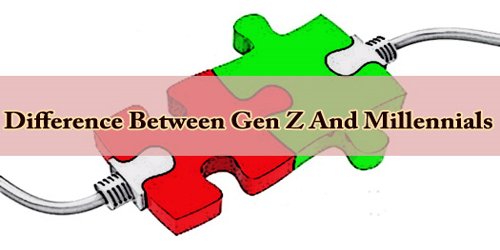A “Millennial” is a person reaching young adulthood around the year 2000. Generation Z (also known as Post-Millennials, the iGeneration, Founders, Plurals, or the Homeland Generation) is the demographic cohort following the Millennials. They are characterized as technology savvy and they daily use social media sites like Facebook, Instagram, Twitter, and YouTube. Also, they are passion-oriented, development-focused, driven to make a difference, and motivated by entrepreneurship. Students belonging to these generations may also be seen hanging out together at a university cafeteria due to their overlapping ages.
Definition of Gen Z –
Generation Z (or Gen Z for short and alternatively Zoomers) is the next batch after the generation Y or the millennials. This makes other sources refer to them as the post-millennials. Also, they are sometimes called “iGeneration”, “Gen-Tech”, or “Gen Wii” due to their exposure to the internet since (and even before) birth.
The first use of the term Generation Z may have been in a September 2000 Advertising Age article discussing changes that would take place in education over the following years as this demographic cohort entered schools. Other proposed names for the generation include iGeneration, Gen Tech, Gen Wii, Homeland Generation, Net Gen, Digital Natives, Neo-Digital Natives, Plurals, Internet Generation, Post-Millennials, and Zoomers. The Pew Research Center surveyed the various names for this cohort on Google Trends in 2019 and found that in the U.S., the term “Generation Z” was the most popular by far, so much so that the Merriam-Webster and Oxford dictionaries both have official entries for it.
According to several studies, the following are some of the characteristics of the youngest generation:
- Pragmatic
- Risk-takers
- Highly value authenticity
- Prefer person-to-person contact
- Involved with the community
Members of Gen Z are those born between 1996 and 2015. This puts the age group for Gen Zers in the range of 5 to 24 years old in 2020. Most members of Generation Z are the children of Generation X and sometimes millennials.
Definition of Millennials –
This word came from “millennium” which means a thousand years. The term was coined by historians Neil Howe and William Strauss in 1991. In their book, “Generations”, millennial was chosen to aptly reflect the result of their research which reflected that such generation is highly distinctive as compared to the baby boomers. Moreover, they had thought about the oldest millennials graduating from high school in the year 2000, which was a famed year in the 90s. Howe and Strauss predicted that during the adulthood of the majority of the millennials, family ties would be stronger, criminal behavior would be lessened, and those in their 20s would take less risks. Apparently, these predictions all came true.
The Millennial Generation is also known as Generation Y, because it comes after Generation X those people between the early 1960s and the 1980s. The publication Ad Age was one of the first to coin the term “Generation Y”, in an editorial in August 1993. But the term didn’t age well, and “Millennials” has largely overtaken it. But the terms basically mean the same thing.
The following are some research-based characteristics of millennials:
- Internet-dependent
- Upbeat and receptive
- Atheists or agnostics
- Mix business with pleasure
- Believe that money cannot really buy happiness
In addition, it seems that this generation may be having less sex than any other generation before it. In a survey of more than 26,000 American adults, about 15 percent of Millennials between 20 and 24 reported having no sexual partners since the age of 18. Only 6 percent of GenXers (people born in the 1960s) could claim the same. The Youth Risk Behavior Survey by the Centers for Disease Control and Prevention in 2016 also found that teen Millennials were less sexually active that previous generations.
Difference between Gen Z and Millennials –
The following are the major differences between Gen Z and Millennials:
- Year of Birth – Those belonging to Gen Z were born from 1995 to 2012 while millennials were born from 1980 to 1994. To date, the oldest millennial is 38 years old while the oldest Gen Z is 23.
- Attention Span – Due to the influence of apps and speedier technology, Gen Z tend to have shorter attention spans as compared to millennials. This also implies that millennials could wait longer and endure less entertaining situations than those from generation Z.
- Frugal – Since the millennials experienced the recession, they tend to be more frugal than their younger counterparts. In fact, a survey concluded that millennials have higher preferences to visit a website just to get a discount coupon as compared to Gen Z. Similarly, millennials follow products’ ads before buying them.
- Most Used Devices – The most used devices of Gen Z are smartphones, TV sets, and laptops. On the other hand, millennials most often use desktops, smartphones, and TV sets.
- Exposure to Ads – As compared to millennials, those from Gen Z are more difficult to be reached by advertisements since many of them are on multiple platforms and they are more active in using adblocking software.
- Social Media Sites – Though both Gen Z and Millennials actively use social media sites, a survey indicated that millennials tend to use Pinterest more frequently while Gen Z are more into Vine. This implies that the older generation is more comfortable with sharing and browsing pictures while millennials prefer videos more.
- Working Attitude – The working personality of most millennials veer towards independence while that of Gen Z reflects the team player attitude.
- Multi-tasking – As compared to millennials, Gen Z thinkers are better at multitasking since their brains have been conditioned to perceive various stimuli which is largely caused by newer apps and devices.
- Population – By 2019, Gen Z is expected to surpass the millennials when it comes to numbers as they will comprise around 32% of the population. In turn, millennials will outnumber baby boomers.
- Personal Connections – As compared to millennials, Gen Z friends look for more quality relationships as compared to meaningless connections. They have apparently learned from their seniors as they have seen how millennials’ quantity-based friendships resulted to less genuine conversations.
- Entrepreneurial Adventures – Gen Z entrepreneurs are more adventurous with their greater desire to start businesses as compared to their predecessors. One of the possible reasons is the lesser amount needed in setting up shop as online entrepreneurship does not need that much financial support. In addition, the mushrooming of start-up companies has encouraged bolder business moves.
- Higher Education – As compared to Gen Z, more millennials think of entering higher education. The younger generations do not feel that comfortable with the traditional educational system and prefer to enroll online and launch their careers early on.
Millennials were considered the first “global” generation with the development of the internet, but as more of the world comes online Generation Z will become more global in their thinking, interactions, and relatability. 58% of adults worldwide ages 35+ agree that “kids today have more in common with their global peers than they do with adults in their own country.” Diversity will be an expectation of Generation Z.
Information Sources:
















